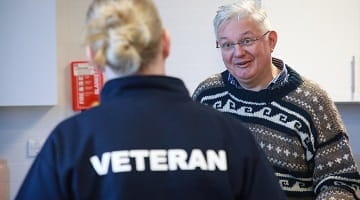Why study this course with LJMU?
- Accredited by the General Pharmaceutical Council (GPhC)
- Taught by one of the oldest and well-established schools of pharmacy in the world
- Excellent links and work placement opportunities with leading local hospitals, community pharmacies and primary care teams
- Strong focus on the application of science to clinical practice
- Work placements, student-patient engagement and inter-professional learning from Year 1
- Strong support for students personal and professional development to help achieve their full potential
- LJMU ranked 18th in the UK for pharmacy and pharmacology (The Guardian University Guide 2025)
- 97% of students surveyed said the teaching staff on this course were good at explaining things (NSS 2024)
- International Foundation Year course available offering direct progression onto this degree programme - visit LJMU's International Study Centre to find out more
About your course
By studying the professionally-accredited undergraduate Masters degree in Pharmacy (MPharm) at Liverpool John Moores University you will enjoy innovative and high quality pharmacy teaching, plus opportunities to complete placements in community, hospital and primary care settings, inter-professional learning, patient/public engagement and practice simulations.
The MPharm Pharmacy programme offers you the opportunity to develop as a key healthcare practitioner with an advanced understanding of the science-basis for practice, leading you to become an 'expert in medicines'. We place a strong emphasis on ensuring the development of knowledge, skills, attitudes, behaviours and values necessary for individuals to work in partnership with patients and other healthcare professionals in order to provide accessible, compassionate and integrated person-centred care with a focus on enhancing patient outcomes.
Our MPharm programme undergoes continual review to ensure we provide our students with the most up-to-date knowledge, practice-relevant skills and professional confidence to become competent, safe and effective person-centred prescribing practitioners, while still retaining the advanced scientific knowledge and skills basis that is so unique to pharmacy.
Students will graduate from the LJMU programme with the confidence to continue personal and professional development more independently, with the confidence to begin making good clinical and professional decisions based on evidence and risk assessment, and with a spirit of team-based working. Following graduation with an MPharm Pharmacy degree, students will be fully prepared to begin the Foundation Training Year for trainee pharmacists, as part of the formal professional development path leading towards registration with the GPhC.
Course modules
What you will study on this degree
Further guidance on modules
Modules are designated core or optional in accordance with professional body requirements, as applicable, and LJMU’s Academic Framework Regulations. Whilst you are required to study core modules, optional modules provide you with an element of choice. Their availability may vary and will be subject to meeting minimum student numbers.
Where changes to modules are necessary these will be communicated as appropriate.
Core modules
Integrated Foundations of Pharmacy
0 credits
0 credits
The entire curriculum for year 1 of MPharm Pharmacy is taught in this module. This single module approach to delivery ensures we integrate the science and practice through all aspects of learning and development. Year 1 topics include the underpinning sciences (anatomy and physiology, basic principles of pharmacology, cells and biomacromolecules, principles of medicinal chemistry) and a number of patient-focused systems including Blood, the Gastrointestinal system, and the Peripheral Nervous System. The application of knowledge to practice forms a continuous strand through this level of study, both on campus and on placement.
Person-Centred Care assessment
20 credits
20 credits
This module is solely for assessment and this assessment focuses on student understanding of patient-centred care in year 1.
Formulary assessment
20 credits
20 credits
This module is solely for assessment and this assessment focuses on student understanding and early development of a personal formulary in year 1.
End of Year examination paper 1
30 credits
30 credits
This module is solely for assessment and this is a synoptic assessment of student learning from year 1.
End of Year examination paper 2
30 credits
30 credits
This module is solely for assessment and this examination assesses student ability to make professional decisions and to justify those decisions based on good evidence and sound reasoning.
Pharmacy skills assessment
0 credits
0 credits
This module is solely for assessment and this assessment focuses on student practice-based skills.
Pharmacy Law and Ethics assessment
0 credits
0 credits
This module is solely for assessment and this assessment focuses on student knowledge and understanding of how the Law applies to pharmacy practice.
Professional Portfolio assessment
0 credits
0 credits
This module is solely for assessment and this assessment focuses on student reflective practice and personal development.
Pharmaceutical calculations assessment
0 credits
0 credits
This module is solely for assessment and this assessment focuses on student ability to accurately perform calculations.
Research Skills assessment
20 credits
20 credits
This module is solely for assessment and this assessment focuses on student research skills in year 1.
Core modules
Medicines, Patients and the Pharmacist
0 credits
0 credits
The entire curriculum for year 2 of MPharm Pharmacy is taught in this module. This single module approach to delivery ensures we integrate the science and practice through all aspects of learning and development. Year 2 topics build on those from year 1 and include the Central Nervous System, the Cardiovascular system, the Respiratory system, and Infection control. The application of knowledge to practice continues to form a key strand through this level of study, both on campus and on placement.
Formulary Assessment
20 credits
20 credits
This module is solely for assessment and this assessment focuses on student understanding and early development of a personal formulary in year 2.
Professional Portfolio assessment
0 credits
0 credits
This module is solely for assessment and this assessment focuses on student reflective practice and personal development.
Research Skills assessment
20 credits
20 credits
This module is solely for assessment and this assessment focuses on student research skills in year 2.
Person-Centred Care assessment
20 credits
20 credits
This module is solely for assessment and this assessment focuses on student understanding of patient-centred care in year 2.
End of Year examination paper 1
30 credits
30 credits
This module is solely for assessment and this is a synoptic assessment of student learning from year 1 and year 2.
End of Year examination paper 2
30 credits
30 credits
This module is solely for assessment and this examination assesses student ability to make professional decisions and to justify those decisions based on good evidence and sound reasoning.
Pharmacy skills assessment
0 credits
0 credits
This module is solely for assessment and this assessment focuses on student practice-based skills.
Pharmacy Law and Ethics assessment
0 credits
0 credits
This module is solely for assessment and this assessment focuses on student knowledge and understanding of how the Law applies to pharmacy practice.
Pharmaceutical Calculations assessment
0 credits
0 credits
This module is solely for assessment and this assessment focuses on student ability to accurately perform calculations.
Optional modules
Study Year Abroad - Pharmacy
120 credits
120 credits
This is an additional year of full-time study abroad at an approved higher education institution. The modules to be studied would be agreed in advance, and will be appropriate for your programme of study.
Core modules
The Complexities of Healthcare
0 credits
0 credits
The entire curriculum for year 3 of MPharm Pharmacy is taught in this module. This single module approach to delivery ensures we integrate the science and practice through all aspects of learning and development. Year 3 topics include Mental Health, Immunology, Endocrine health and disorders, Oncology and a pharmacy-focused Research Project. The ongoing application of knowledge and skills to practice continues to form an ever more important strand through this level of study, both on campus and on placement. In year 3, students develop a greater focus on clinical reasoning and skills needed for independent prescribing.
Research Skills assessment
20 credits
20 credits
This module is solely for assessment and this assessment focuses on student research skills in year 3.
Person-centred care assessment
20 credits
20 credits
This module is solely for assessment and this assessment focuses on student understanding and demonstration of patient-centred care in year 3.
Formulary assessment
20 credits
20 credits
This module is solely for assessment and this assessment focuses on student understanding and ongoing development of a personal formulary in year 2.
End of Year examination paper 1
30 credits
30 credits
This module is solely for assessment and this is a synoptic assessment of student learning from years 1, 2 and 3.
End of Year examination paper 2
30 credits
30 credits
This module is solely for assessment and this examination assesses student ability to make professional decisions and to justify those decisions based on good evidence and sound reasoning.
Pharmacy skills assessment
0 credits
0 credits
This module is solely for assessment and this assessment focuses on student practice-based skills.
Pharmacy Law and Ethics assessment
0 credits
0 credits
This module is solely for assessment and this assessment focuses on student knowledge and understanding of how the Law applies to pharmacy practice.
Professional Portfolio assessment
0 credits
0 credits
This module is solely for assessment and this assessment focuses on student reflective practice and personal development.
Pharmaceutical Calculations assessment
0 credits
0 credits
This module is solely for assessment and this assessment focuses on student ability to accurately perform calculations.
Core modules
Advancing Person-Centred Care
0 credits
0 credits
The entire curriculum for year 4 of MPharm Pharmacy is taught in this module. This single module approach to delivery ensures we integrate the science and practice through all aspects of learning and development. Year 4 is heavily practice-focused and supports students in integrating the learning and skills from years 1 to 3 to consider the patient as a whole, further developing their skills in providing person-centred care. Students will develop advanced clinical skills, hone their skills in clinical reasoning and professional judgement, and be provided with opportunities to practice their prescribing skills in a safe environment as preparation for the National Foundation Training year.
Research Skills assessment
20 credits
20 credits
This module is solely for assessment and this assessment focuses on student research skills in year 4.
Person-centred care assessment
20 credits
20 credits
This module is solely for assessment and this assessment focuses on student understanding and demonstration of patient-centred care in year 4.
Prescribing Formulary assessment
20 credits
20 credits
This module is solely for assessment and this assessment focuses on student further developing and using their personal formulary as part of their prescribing skills in year 4.
End of Year examination paper 1
30 credits
30 credits
This module is solely for assessment and this is a synoptic assessment of student learning from years 1, 2, 3 and 4.
End of Year examination paper 2
30 credits
30 credits
This module is solely for assessment and this examination assess student ability to make professional decisions and to justify those decisions based on good evidence and sound reasoning.
Pharmacy skills assessment
0 credits
0 credits
This module is solely for assessment and this assessment focuses on student practice-based skills.
Pharmacy Law and Ethics assessment
0 credits
0 credits
This module is solely for assessment and this assessment focuses on student knowledge and understanding of how the Law applies to pharmacy practice.
Professional Portfolio assessment
0 credits
0 credits
This module is solely for assessment and this assessment focuses on student reflective practice and personal development.
Pharmaceutical Calculations assessment
0 credits
0 credits
This module is solely for assessment and this assessment focuses on student ability to accurately perform calculations.
Professional accreditation
The MPharm Pharmacy programme is accredited by the General Pharmaceutical Council (GPhC).
Your Learning Experience
Excellent facilities and learning resources
We adopt an active blended learning approach, meaning you will experience a combination of face-to-face and online learning during your time at LJMU. This enables you to experience a rich and diverse learning experience and engage fully with your studies. Our approach ensures that you can easily access support from your personal tutor, either by meeting them on-campus or via a video call to suit your needs.
Teaching is provided via a combination of structured online learning and lectures, interactive workshops, practical laboratory and clinical practice sessions, small-group tutorials, seminars and professional placements. You will be expected to engage fully with all aspects of the programme (including, for example: lectures, workshops, practicals, simulation and placements) and to undertake additional study around the taught subjects in your own time using our libraries and virtual learning environment, Canvas.
As the course progresses, practical work and clinical skills development accounts for an increasingly large proportion of your study time, and you will also develop some of the skills you need to undertake independent research.
The MPharm Pharmacy programme makes full use of innovative learning enhancement practices, which our students tell us they value very highly. This includes the use of technology to enhance the learning experience, for example through the use of interactive patient communication/clinical assessment mannequins and virtual patient technology during “clinical simulation” workshops. In addition, we incorporate development of a range of clinical, professional and interpersonal skills necessary for becoming an effective and safe, future independent prescriber.
Work-related learning
Applying scientific principles to practical clinical situations is the key focus of this programme, and there is no better way to practise this than by undertaking a professional placement. Thanks to our links with many local hospitals, community pharmacies and primary care providers, you will be able to gain direct experience of the day-to-day work of a pharmacist and build up your skills in preparation for your Foundation Training Year. Employers tell us that our graduates are able to apply excellent clinical skills as soon as they begin work, and this is largely down to clinical experience gained on the course.
Dedicated personal tutor, plus study skills support
One-to-one support is crucial for your academic and career development, and for this reason you will be allocated a personal tutor for the duration of your studies at LJMU. They will arrange regular tutorials with you to discuss course issues, monitor progress, support professional development and plan work.
The school is fully committed to promoting a learning environment that supports a culture of equality, diversity and inclusivity (EDI) and has a Disability Support Coordinator, an EDI Coordinator and a School EDI Working Group. Personal Tutors also play a vital role in promoting awareness of support services for students.
Assessment varies depending on the modules you choose, but will usually include a combination of exams and coursework.
We acknowledge that all students perform differently depending on how they are assessed, which is why we use a combination of different assessment methods. For example, coursework could be in the form of a pharmaceutical care plan for a fictional patient, development of a medicines formulary, preparation and delivery of a research seminar or a viva voce examination to assess your awareness and understanding of your own practice.
We pride ourselves on developing our students by ensuring we equip you with the knowledge and skills base required in your journey to become competent professional pharmacists. As such, we include assessments to ensure you meet the minimum expectations for competence in various skills at each level of study. You will have to carry out clinical examinations of patients and take practical exams to ensure that you can perform the core duties of a pharmacist under UK law and meet the expectations and Professional Standards of the General Pharmaceutical Council.
Over the course of the programme, exams range from multiple-choice or short answer questions to longer analytical essays or discussions of therapeutic strategies in a clinical scenario.
Where you will study
What you can expect from your School
You will study at the Byrom Street site in the university's City Campus in the heart of Liverpool. Our state-of-the-art laboratories and teaching spaces will ensure you enjoy a first-class study environment. The Avril Robarts library is within easy walking distance and here you'll find all the information you need to support your studies.
Course tutors

Dr Alice McCloskey
- Programme Leader
I enjoy teaching on the MPharm course and conducting research. LJMU has a friendly and supportive environment
I enjoy teaching on the MPharm course and conducting research. LJMU has a friendly and supportive environment
Dr McCloskey is a Senior Lecturer in Clinical Pharmacy and Therapeutics. She studied MPharm Pharmacy and has a PhD. Her area of expertise is novel drug delivery systems and medicines use in patients at extremes of age (children and older adults). Dr McCloskey’s research interests span bench to bedside activities. She works closely with the NHS and pharmaceutical industry to improve the use of existing medicines in patients at the extremes of age. She also designs novel formulations to provide a personalised medication approach for patients where formulations do not exist or conditions have no cure. Dr McCloskey’s work contributes to research and teaching in pharmacy and pharmaceutical sciences. She is co-lead of the Clinical Pharmacy and Therapeutics Research Group and a member of the Formulation and Drug Delivery Research Group and Institute for Health Research.
-
 Non Contracted
Non Contracted -
 Lecturer/Senior Lecturer
Lecturer/Senior Lecturer -
 Lecturer/Senior Lecturer
Lecturer/Senior Lecturer -
 Lecturer/Senior Lecturer
Lecturer/Senior Lecturer -
 Lecturer/Senior Lecturer
Lecturer/Senior Lecturer -
 Lecturer/Senior Lecturer in Clinical pharmacy
Lecturer/Senior Lecturer in Clinical pharmacy -
 Lecturer/Senior Lecturer
Lecturer/Senior Lecturer


You are prepared for the challenges you may face in your career and the future. The course is based on the application of knowledge to real life scenarios, enabling you to think critically
Career paths
The MPharm qualification is your first step towards qualification as a pharmacist in the UK.
When you graduate, you will need to undertake a Foundation Training Year in practice and be successful in a national registration assessment to register with the General Pharmaceutical Council (GPhC). Once you have demonstrated your practical competence, taken professional examinations and provided the GPhC with a statement of fitness to practice (and sometimes evidence of a Disclosure Barring Service check), you will be eligible to work in any branch of pharmacy.
The School of Pharmacy and Biomolecular Sciences has strong links with a number of leading hospitals and primary care providers, including the Liverpool University Hospitals Foundation Trust (at the Royal and at Aintree), Broadgreen, Arrowe Park (Wirral), Countess of Chester, Alder Hey Children's Hospital, Whiston Hospital, Cheshire and Wirral Partnership (Mental Health) Trust, Merseycare and the Clatterbridge Cancer Centre, and also with local GP medical centres and community pharmacies. This means you can be confident that you will have excellent training on placement and with teacher-practitioner pharmacists on campus during your studies.
A career in pharmacy has excellent prospects and salaries are very competitive. Most pharmacists work in hospitals, health centres and community pharmacies. There are also opportunities in the drugs development industry or in university-based research.
Useful links
Royal Pharmaceutical Society (RPS)
The site provides more information on pharmacy as a career; the different sectors pharmacists can work in – such as community, hospital and industry; and videos of different specialisms within pharmacy – such as A&E pharmacists. Information is also available about pharmacist independent prescribing.
General Pharmaceutical Council (GPhC)
The General Pharmaceutical Council (GPhC) is the pharmacy regulator. The Council's job is to protect, promote and maintain the health, safety and wellbeing of members of the public by upholding standards and public trust in pharmacy. The site includes details regarding the education requirements of become a pharmacist.
Student Futures - Careers, Employability and Enterprise Service
A wide range of opportunities and support is available to you, within and beyond your course, to ensure our students experience a transformation in their career trajectory. Every undergraduate curriculum includes Future Focus during Level 4, an e-learning resource and workshop designed to help you to develop your talents, passion and purpose.
Every student has access to Careers Zone 24/7, LJMU's suite of online Apps, resources and jobs board via the LJMU Student Futures website.
Tuition fees and funding
- Home full-time per year:
- £9,535
Fees
The fees quoted above cover registration, tuition, supervision, assessment and examinations as well as library membership and student IT support with access to printed, multimedia and digital resources including programme-appropriate software and on campus Wi-Fi.
Financial Support
The University offers a range of scholarships to support students through their studies. You'll find all the information you need on our specialist funding pages, including details of the Student Support Fund and other activities to support with the cost of living.
Additional Costs
In addition to fees, students should also keep in mind the cost of:
- Accommodation
- Travel costs including those for placements, visas and travel for studying abroad and field trips unless paid for by LJMU
- Stationery, IT equipment, professional body membership and graduation gown hire
The University reserves the right to increase tuition fees in accordance with any changes to the maximum allowable fees set by the UK Parliament. In the event of such a change, any fee increase will be subject to a maximum cap of 10% of the total course cost as originally stated at the time of your offer.
- International full-time per year:
- £18,250
International Scholarships and payment plans
Liverpool John Moores University is committed to supporting international students by providing a range of scholarships and flexible payment plans to help students manage their tuition fees.
Scholarships
LJMU provides a variety of undergraduate scholarships to support international students. Scholarships are available to self-funded students who have accepted their offer and met all the conditions outlined in their offer letter. Students must also demonstrate that they can cover living costs, travel, and other expenses associated to studying at the university.
All self-funded international students are eligible for an automatic scholarship worth up to £4,000. For more details and to view our full list of scholarships, visit the international scholarship webpages.
Deposit
All students must pay a £5,000 deposit before they can receive their CAS letter.
For more information view our deposit page.
Tuition Fee Payment Plan
After paying their £5,000 deposit, students have the option to pay their fees in full or in three equal instalments minus any internal scholarships and discounts. There are two payment options available for international students. You can either pay your tuition fees in full before enrolment or opt for a payment plan. With the payment plan, you can pay your fees in three instalments after making your £5,000 deposit. The first instalment is due before enrolment.
All payments should be made through Flywire. Full details can be found in the How to Pay Guide.
Early Bird Tuition Fee discount
We are excited to introduce a £500 Early Payment Discount to all self-funded international students. Eligible self-funded students who pay their fees by the required deadlines will get a discount which will be automatically deducted from the 1st year of tuition fees.
To see the required deadlines please visit the webpage
There will be transport costs for placements across all levels.
Entry requirements
Please choose your qualifications below to view requirements
Grades/points required from qualifications: BBB-ABB (120-128)
Work out how many UCAS points your qualifications are worth by visiting the UCAS Tariff Calculator.
Qualification requirements
GCSEs and equivalents
Grade 4 or grade C or above in English Language and Mathematics/ Numeracy.
GCSE Equivalences accepted:
• Key Skills Level 2 in English/Maths
• NVQ Level 2 Functional skills in Maths and English Writing and or Reading
• Skills for Life Level 2 in Numeracy/English
• Higher Diploma in Maths/English
• Northern Ireland Essential Skills Level 2 in Communication or Application of Number
• Wales Essential Skills Level 2 in Communication or Application of Number
A levels
BBB-ABB
Minimum Number of A Levels: 2
Maximum AS UCAS Points: 20
General Studies: Not accepted
One A'level in Chemistry or Biology and a second science A'level in one of Chemistry, Biology, Physics, Maths or Psychology. General Studies is not acceptable
BTECs
BTECs will only be considered if accompanied by A Level Chemistry or Biology at grade B and a second science A Level also at grade B.
Access awards
Acceptable on its own and combined with other qualifications Applicants must achieve a Distinction in all of the graded level three Access programme modules. Biology and Chemistry must be covered.
International Baccalaureate
Acceptable on its own and combined with other qualifications From a relevant subject. Needs to include advanced level biology and chemistry
OCR Cambridge Technical
Extended Diploma: DDM
and at least 2 'A2' levels or equivalent, including Chemistry at grade B or above and preferably one further science subject
Irish awards
Acceptable on its own and combined with other qualifications Chemistry and Biology must be taken at Higher Level
T levels
TLevels/NCFE's will only be considered if accompanied by A Level Chemistry or Biology at grade B and a second science A Level also at grade B.
Additional requirements
-
Interview required
Yes
Admissions Process
- All applicants will be sent an assessment by email with full instructions and a deadline for submission.
- Once assessments are returned applications will be assessed, and qualifications will be checked to see that they meet or are predicted to meet our entry requirements. We would expect applicants’ personal statements to demonstrate preparation for and commitment to studying this course and to becoming a Pharmacist.
- Shortlisted applicants will be invited to an interview and offers will be made to successful applicants.
- All applicants must provide a satisfactory reference with their application, failure to do so will result in a rejected application.
-
Assessment required
Yes
Further information
-
DBS, Occupational Health requirements
Additional Requirements for Non-UK Students:
- Criminal Records Check (from your home country)
- Letter of Good Character (written in English)
Applicants should review the communication from the International Admissions Office who will contact applicants directly with all relevant forms and paperwork. Further information is also available on the fitness to practise web pages.
International requirements
IELTS
7.0 overall with no components below 6.5, taken within two years of the course start date.
https://www.ljmu.ac.uk/study/courses/international-entry-requirements
Please Note: All international qualifications are subject to a qualification equivalency check.
How to apply
Securing your place at LJMU
UCAS is the official application route for our full-time undergraduate courses. Further information on the UCAS application process can be found here https://www.ljmu.ac.uk/study/undergraduate-students/how-to-apply.
All candidates who pass the initial admissions assessment will be interviewed. In order to prepare for your interview you should consider the following:
- Consider why you are interested in studying pharmacy
- Think about what a pharmacist does in their day-to-day role and what the different roles involve (for example community versus hospital pharmacy)
- Consider what key values a pharmacist needs in their profession
The interview will last approximately 15 minutes. Please ensure that you have valid ID with you to show the interviewer.
Your university life
From accommodation and academic support to clubs and societies. Find out what LJMU has to offer.
Related Links
Talk to our students
Connect with a current LJMU student for advice and guidance on university life, courses and more.
See what our students are saying
At LJMU we want you to know you're making the right choice by studying with us. You can see what our students are saying about their experience with us via the following websites:
Related Links
News and views
Browse through the latest news and stories from the university










The university reserves the right to withdraw or make alterations to a course and facilities if necessary; this may be because such changes are deemed to be beneficial to students, are minor in nature and unlikely to impact negatively upon students or become necessary due to circumstances beyond the control of the university. Where this does happen, the university operates a policy of consultation, advice and support to all enrolled students affected by the proposed change to their course or module.
Further information on the terms and conditions of any offer made, our admissions policy and the complaints and appeals process.




















